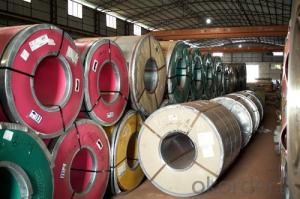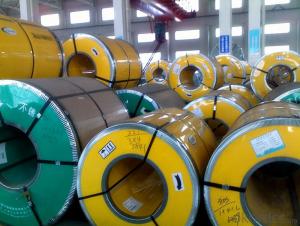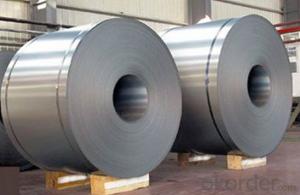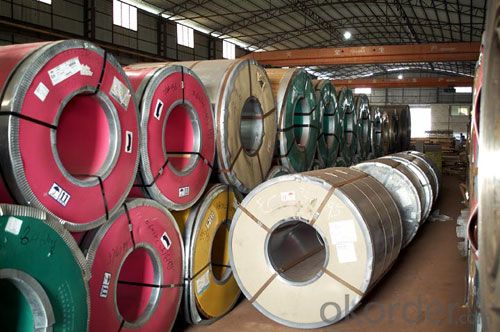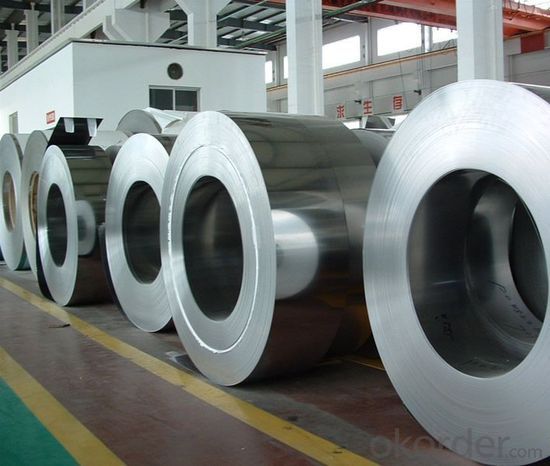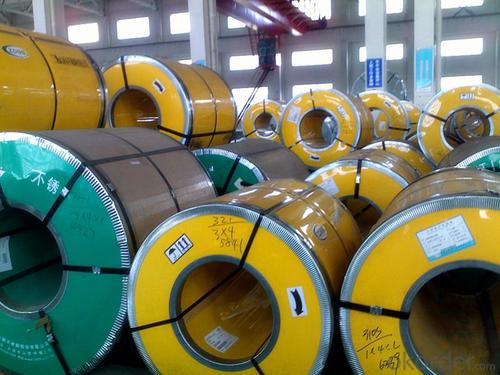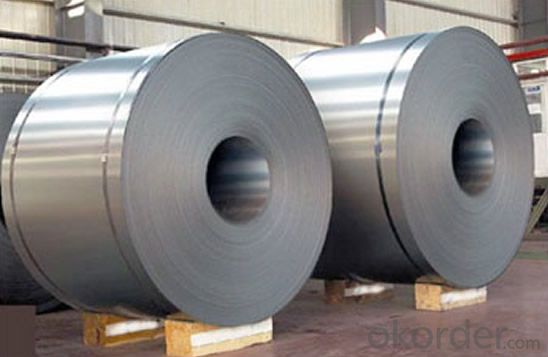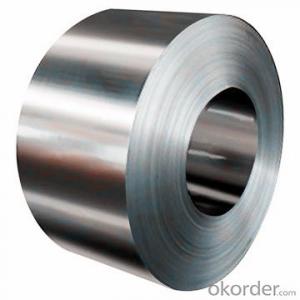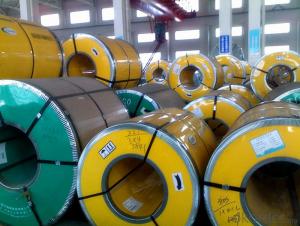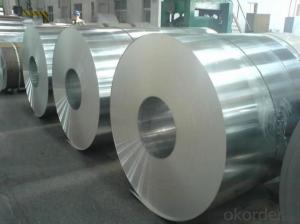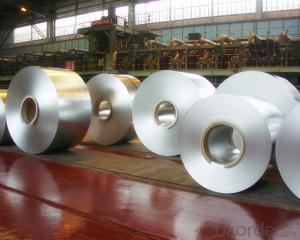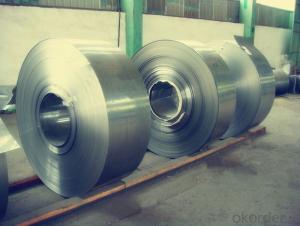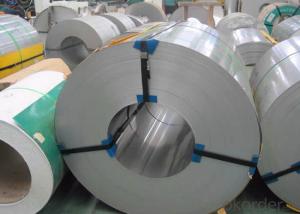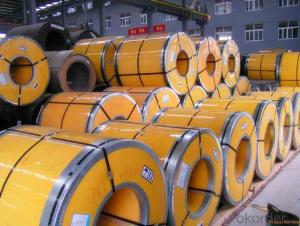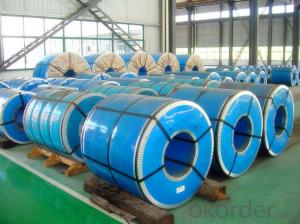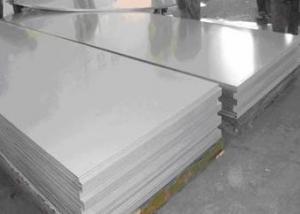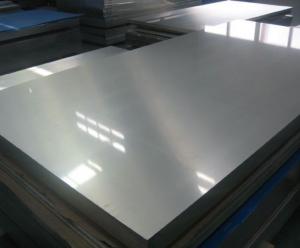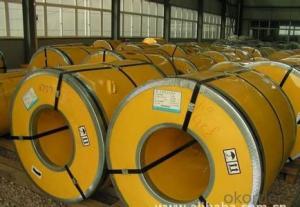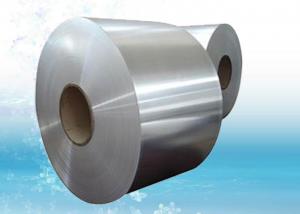Hot / Cold rolled Stainless Steel Coil
- Loading Port:
- Qingdao
- Payment Terms:
- TT OR LC
- Min Order Qty:
- -
- Supply Capability:
- 5000 m.t./month
OKorder Service Pledge
OKorder Financial Service
You Might Also Like
Hot / Cold Rolled Stainless Steel Coil
1. | Item | STAINLESS STEEL COIL | ||
2. | Standard | ASTM,AISI,GB,JIS,SUS,EN,DIN,etc. | ||
3. |
Material | 200 series | 300 series | 400 series |
201,202 | 300,301,304,304L,309S,310S,316Ti,316L, 317L,321,329,329LA,329LD | 409,410,430,430LX,600,601 | ||
4. |
Specification | Thickness | 0.1mm-200mm | |
Width | 1000mm-3000mm | |||
Length | 1m-12m | |||
5. | Surface | No.1,No.4,No.5,BA,2B,hair line,embossed,mirror finish,etc | ||
6. | Application | Stainless steel coils s are widely used in: 1:Chemical industry equipment,industrial tanks 2:Medical instruments,tableware,kitchen utensil,kitchen ware. 3:Architectural purpose,milk or food processing facilities. 4:Hospital equipment,interior exterior decoration for building 5:Architectural purposes,escalators,kitchen ware,vehicles. Or they can be made as your requirement. | ||
7. | Package | Standard export package. | ||
8. | Export to | Asia,Africa,Europe,Middle East,South and North America,Oceania,etc | ||
9. | Contact | please feel free to contact CNBM | ||
- Q: What are the different types of protective coatings for stainless steel strips?
- There are several types of protective coatings available for stainless steel strips, including organic coatings, metallic coatings, and conversion coatings. Organic coatings such as epoxy, polyurethane, and acrylic are applied as a barrier against corrosion and provide excellent resistance to weathering and chemicals. Metallic coatings like zinc, tin, and aluminum can be applied through processes like electroplating or hot-dipping, providing both corrosion resistance and additional aesthetic appeal. Conversion coatings such as passivation or chromate conversion create a thin layer on the surface of the stainless steel, enhancing its resistance to corrosion and improving adhesion for subsequent coatings.
- Q: What are stainless steel strips used for?
- Due to their unique properties and versatility, stainless steel strips have a wide range of applications. Various industries, including automotive, construction, aerospace, and manufacturing, commonly utilize them. In the production of kitchen appliances and utensils, stainless steel strips are essential. Their corrosion-resistant nature prevents rust and staining, ensuring a longer lifespan for these products. Additionally, they are used to fabricate sinks, countertops, and backsplashes, which provide a durable and hygienic surface that is easy to clean. Within the automotive industry, stainless steel strips are employed in the manufacturing of exhaust systems, mufflers, and trim components. This is due to their high-temperature resistance and corrosion resistance, which guarantee longevity and performance even in harsh conditions. Construction and architecture also benefit from stainless steel strips. These strips can be found in structural components such as beams, columns, and reinforcement bars. In environments where corrosion or weathering is a concern, the durability and strength of stainless steel make it an ideal choice. The manufacturing industry relies on stainless steel strips for the fabrication of machinery and equipment. Conveyor belts, springs, and fasteners are all made using these strips. The strength, toughness, and resistance to wear and tear of stainless steel make it a reliable choice in these applications. In conclusion, stainless steel strips are essential materials in a wide range of applications. Their corrosion resistance, durability, strength, and aesthetic appeal make them versatile and indispensable in various industries.
- Q: How do you prevent stainless steel strips from rusting?
- To prevent stainless steel strips from rusting, there are several measures you can take: 1. Regular cleaning: Stainless steel should be cleaned regularly with mild soap or detergent and warm water. This helps remove any dirt, grime, or contaminants that can promote corrosion. 2. Avoid abrasive cleaners: Harsh or abrasive cleaners can scratch the surface of stainless steel, creating micro-abrasions where rust can start. Stick to non-abrasive cleaners and soft cloths or sponges for cleaning. 3. Dry thoroughly: After cleaning, make sure to dry the stainless steel strips completely. Moisture left on the surface can lead to rust formation. Use a clean, dry cloth or towel to remove any remaining moisture. 4. Remove rust spots promptly: If you notice any rust spots forming on the stainless steel strips, it's crucial to remove them as soon as possible. Use a stainless steel cleaner or a mixture of baking soda and water to gently scrub away the rust. Rinse thoroughly and dry the area to prevent further corrosion. 5. Apply a protective coating: There are various protective coatings available specifically designed for stainless steel. These coatings create a barrier between the metal and the environment, preventing rust formation. Follow the manufacturer's instructions for application and reapplication. 6. Avoid contact with corrosive substances: Stainless steel should be kept away from corrosive substances such as acids, bleach, or saltwater. If contact occurs, immediately rinse the affected area with plenty of clean water and dry it thoroughly. 7. Store in a dry environment: When not in use, it's essential to store stainless steel strips in a dry environment. Moisture and humidity can contribute to rust formation. Consider using desiccant packs or silica gel to absorb any moisture in the storage area. By following these preventative measures, you can significantly reduce the chances of your stainless steel strips rusting and ensure their longevity and appearance for years to come.
- Q: What are the factors affecting the thermal conductivity of 111 stainless steel strips?
- The factors affecting the thermal conductivity of 111 stainless steel strips include the composition and microstructure of the steel, the presence of alloying elements, the grain size and orientation, the temperature, and the presence of impurities or defects in the material.
- Q: What is the thermal conductivity of stainless steel strips?
- The thermal conductivity of stainless steel strips may differ based on the particular alloy and grade employed. On average, stainless steel possesses a thermal conductivity that falls between 14 and 19 watts per meter-Kelvin (W/m-K). It is noteworthy to consider that the thermal conductivity can be impacted by variables like temperature, composition, and the existence of additional elements within the alloy. Consequently, it is advisable to seek advice from the manufacturer or refer to specific technical data sheets to obtain accurate and precise values of thermal conductivity for a given stainless steel strip.
- Q: Are stainless steel strips suitable for chemical reactors?
- Yes, stainless steel strips are suitable for chemical reactors. Stainless steel is a popular material choice for chemical reactors due to its excellent corrosion resistance properties. It is resistant to many corrosive chemicals, including acids, bases, and salts, making it highly suitable for use in various chemical processes. Stainless steel strips offer good structural strength, thermal stability, and durability, making them an ideal choice for constructing the shell and internal components of chemical reactors. Additionally, stainless steel is easy to clean and maintain, which is crucial in ensuring the integrity and efficiency of the chemical reactor. Overall, stainless steel strips are a reliable and suitable material for chemical reactors, providing the necessary resistance and performance required for handling various chemical reactions.
- Q: Can 111 stainless steel strips be etched or engraved for customization?
- Yes, 111 stainless steel strips can be etched or engraved for customization.
- Q: What are the factors affecting the hardness of 111 stainless steel strips?
- The factors that can affect the hardness of 111 stainless steel strips include the composition of the steel, the heat treatment process used, the amount of cold work or deformation applied, the presence of impurities or alloying elements, and the cooling rate during solidification and heat treatment. Additionally, the grain size and microstructure of the steel can also influence its hardness.
- Q: What are the common uses of stainless steel strips in the aerospace industry?
- Due to their exceptional properties and characteristics, stainless steel strips find numerous applications in the aerospace industry. Fabricating aircraft components is one of their primary uses. These strips are crucial in producing structural parts like wing spars, fuselage frames, and landing gear components. The outstanding strength and corrosion resistance of stainless steel make it the perfect material for these critical components. It guarantees the aircraft's structural integrity and longevity. Aerospace manufacturers often prefer stainless steel strips over other materials due to their ability to endure extreme temperatures and pressures encountered during flight. Another significant application of stainless steel strips in the aerospace industry involves exhaust systems. These strips are essential in constructing exhaust pipes, mufflers, and heat shields. Thanks to stainless steel's heat resistance properties, it can withstand the high temperatures generated by aircraft engines while maintaining its structural integrity. Furthermore, stainless steel strips are employed in fabricating fuel tanks and hydraulic systems for aircraft. The corrosion resistance of stainless steel guarantees the protection and longevity of these vital components, preventing leaks and failures. Moreover, stainless steel strips are utilized in aerospace fastener manufacturing. They are instrumental in creating a range of screws, bolts, and rivets that hold aircraft components together. The high tensile strength and durability of stainless steel make it the ideal material for these fasteners, ensuring the aircraft's structural stability and safety. In conclusion, stainless steel strips play a crucial role in the aerospace industry due to their outstanding properties. They are widely used in fabricating structural components, exhaust systems, fuel tanks, hydraulic systems, and fasteners. The high strength, corrosion resistance, and heat resistance of stainless steel make it an indispensable material for guaranteeing the safety, reliability, and performance of aircraft.
- Q: What are the recommended machining techniques for 111 stainless steel strips?
- When it comes to machining 111 stainless steel strips, there are several recommended techniques that can ensure optimal results. 1. Cutting: For cutting stainless steel strips, it is advisable to use a high-speed steel (HSS) saw blade or a carbide-tipped saw blade. These blades are known for their hardness and durability, allowing for efficient and precise cuts. Additionally, using a lubricant during the cutting process can help reduce friction and heat buildup. 2. Drilling: When drilling holes in stainless steel strips, it is recommended to use a cobalt or carbide drill bit. These materials can withstand the high hardness of stainless steel and maintain their sharpness for longer periods. It is also important to use a cutting lubricant to prevent overheating and extend the life of the drill bit. 3. Grinding: Grinding stainless steel strips can be achieved using a variety of abrasive wheels, such as aluminum oxide or ceramic. These wheels are designed to handle the hardness of stainless steel and provide a smooth and consistent finish. It is essential to use a coolant during grinding to prevent overheating and maintain the integrity of the strip's surface. 4. Bending: When bending stainless steel strips, it is crucial to use proper tooling to avoid deformation or cracking. Using a press brake or a roller with rounded edges can help achieve precise and uniform bends without causing damage to the strip. Additionally, annealing the strip before bending can make it more pliable and reduce the risk of cracking. 5. Welding: Stainless steel strips can be welded using various techniques, such as TIG (Tungsten Inert Gas) or MIG (Metal Inert Gas) welding. It is important to use a filler material compatible with the specific grade of stainless steel being used. Preheating the strip before welding can help reduce distortion and improve the quality of the weld. Overall, it is crucial to select the appropriate tools and techniques for machining stainless steel strips to ensure the best results. It is also recommended to consult the manufacturer's guidelines or seek the advice of a professional machinist for specific recommendations tailored to the particular grade of stainless steel being processed.
Send your message to us
Hot / Cold rolled Stainless Steel Coil
- Loading Port:
- Qingdao
- Payment Terms:
- TT OR LC
- Min Order Qty:
- -
- Supply Capability:
- 5000 m.t./month
OKorder Service Pledge
OKorder Financial Service
Similar products
Hot products
Hot Searches
Related keywords
